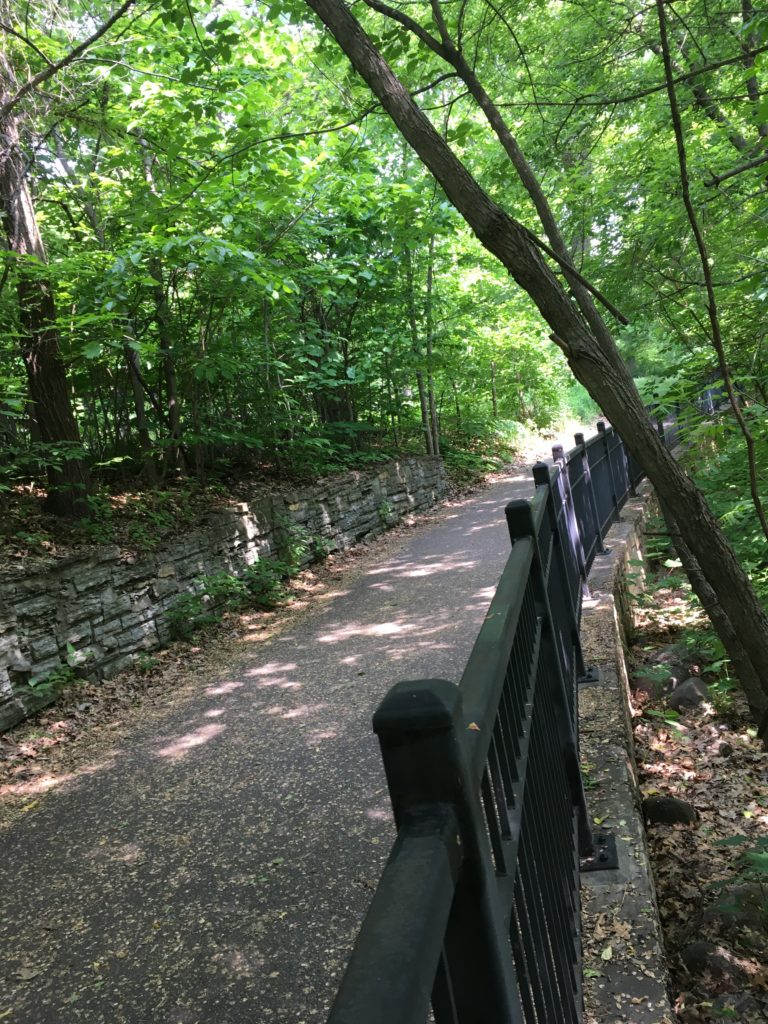3.5 miles
river road path, north/south
63 degrees
87% humidity/dew point: 61
Even though the humidity and dew point were high, this run wasn’t miserable. It helped that it was only 63 degrees. Ran a little faster than I realized. Spent a lot of time trying to slow down my breathing with chanting: “strawberry/yogurt” in 2 3/out 2. Couldn’t see the river or hear any rowers. Greeted other runners. Didn’t see any roller skiers or rollerbladers or many bikers. No dogs. No squirrels. Only one large-ish group of runners. Thought a lot about the stretch of the trail (my favorite part, which dips below the road) that I’m writing at least 2 haibuns about. I’ve written one about descending into it already. The second one is about ascending. After stopping to study it, I’ve realized that the season for the haibun is late August, when the trees are thick with leaves and heavy with trapped humidity/insects. When you can’t see the river or the road or the forest because of all of the green.
Almost forgot–a bug flew on my face and then into my mouth mid-run. I was able to spit it out, which was gross. At least I didn’t gag on it, like I have in the past. Yuck!
Summer/Ronald Johnson (1967)
excerpt
2
What the Earth Told Me
No surface is allowed to be bare,
& nothing to stand still. A man could forever study a pebble
& at last see dilations & expansions of the hills—
to pull the most slender stalk, is to jostle the stars,
& between the bearded grass
& man ‘looking in the vegatable glass
of Nature’, is a network of roots & suckers
fine as hairs.
I threw a stone upon a pond
& it bounded the surface, its circles interlacing
& radiating out to the most ephemeral edge.
Flint & Mica, Lichened Limestone, Shale & Sarcens, Sandstone, Soil.
I saw the wind moving on a meadow
& the meadows moving under wind—
lifting, settling & accumulating.
Flint & Mica, Lichened Limestone,
Shale & Sarcens, Sandstone, Soil.
3
What the Air Told Me
It is breathed into Orpheus’ lyre & as rocks & trees & beasts
is divided there. Its origins strain
precedes the sound, by as much as echoes follow after:
the quivering of ‘cow-quake’, a ‘loud audible
humming of bees on the down’, stresses within the sustaining earth,
clouds of fleece & mare’s tail.
I saw with single eye, the facet of the fly—
the infinitesimal mechanics & all the metallic sheens
of a blue-bottle. In a land where the sun grows fat on cloud
& summer hasn’t come
till your foot can cover twenty daisies,
she came to the dark, open beak
& laid a myriad of eggs. And in two day’s time the dead
bird’s body simulated life: maggots in eye-socket &
under feather, in a subtle movement.
The White & The Glistening.
4
What the Leaf Told Me
Today I saw the word written on the poplar leaves.
It was ‘dazzle’. The dazzle of the poplars.
As a leaf startles out
from an undifferentiated mass of foliage,
so the word did from a leaf—
A Mirage Of The Delicate Polyglot
inventing itself as cipher. But this, in shifts & gyrations,
grew in brightness, so bright
the massy poplars soon outshone the sun . . .
‘My light—my dews—my breezes—my bloom’. Reflections
In A Wren’s Eye.
